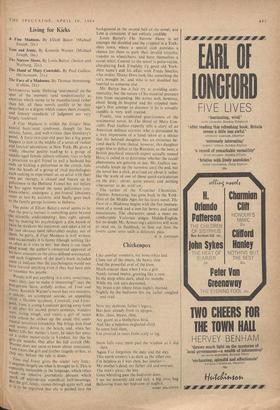Living for Kicks
The Hand of Mary Constable. By Paul Gallico. (Heinemann, 21s.) The Face of a Madonna. By Thomas Armstrong. (Collins. 21s.) SENTIMENTAL Week. Defining 'sentimental' on the spur of the moment (and tendentiously) as emotion which seems to be manufactured rather than felt, all these novels qualify to be thus described to a degree which makes them escapist, and literary standards of judgment are very largely irrelevant.
A Fine Madness is within the Ginger Man asocial bumisaint syndrome, though far less serious, funny, and well-written than Donleavy's novel. A forty-two-year-old poet has a big poem happen to him in the middle of a series of violent and farcical adventures in New York. He gives a wildly obscene poetry reading to a group of middle-aged female culture-vultures, tries to help a prostitute ex-girl friend to nail a husband but ends up kicking a policeman in the crotch, falls Into the hands of a group of rival psychologists each seeking to experiment on an artist with their °wri, pet therapy, is chased and beaten up by policemen in the Holland Tunnel but not before he has again booted the same policeman you- know-where, undergoes a pre-frontal lobotoniy more or less by accident, and finally goes back to the family garage business in Indiana.
The point of Elliott Baker's novel seems to be that the poetic instinct is something quite beyond the 'scientific understanding:. line, right, agreed, but by making his psychologists a dim bunch. of twits he weakens his statement and takes a lot of far too obvious (and rebuttable) mickey out of them. In parts, A Fine Madness is well written, and occasionally it is funny (though nothing like as often as it tries to be): 'but there is too much dead wood, the author's unreserved approval of his hero amounts to the afore-defined sentimental, and such fragments of the poet's work included seem to indicate that the psychologists would not have learned anything even if they had been able to examine his psyche.
'People will put anything in a story sometimes, won't they, just to make it interesting?' says the lirst-person hero, artfully artless, of Torn and J"110'. Kenneth Warner's novel has two murders, a . suicide, an attempted suicide, an appealing child, a likeable layabout, Cornwall,. and Liver- Pool. Tom, a young Londoner getting away from it all after his second prisol sentence, wanders "'est. living rough, and meets a girl of seven
\vith whom he strikes up the usual (for senti- mental novelists) friendship. She brings him food and money down to the beach, and, when her father kills her mother's lover, he takes her away on a stolen motor-cycle to London; for this he
gets six months. Out after his full stretch (Mr. Warner does not seem to know about remission), orn traces the girl and further tragedy strikes, as they say, before the tale is done.
Toni and Jenny gives the 'reader very little:
tienends largely on what is brought to it. This is especially noticeable in the language, which relics much on emotive jdurnalistic phrases which !Park off appropriate superficial half-meanings. But the girl, Jenny, comes through quite well, and it is to be regretted that she is pushed into the
background in the second half of the novel; and Torn is consistent if not entirely credible.
Louis Battye's The Narrow Shore is set amongst the disabled and the crippled in a York- shire town, where a special club provides a chance for thorn to park their invalid tricycles, transfer to wheelchairs, and have themselves a social whirl. Central to the novel is polio-victim, alto-playing Jack Umpleby Ca good old York- shire name') and his affair with Freda Smailes, who mak'es 'Diana Dors look like something the cat's brought in,' and who is not disabled but married to. someone else.
Mr. Battye has a fair try at avoiding senti- mentality, but the nature cf his material prevents him from succeeding. He writes well, however, about being in hospital and his crippled teen- ager's first attempt to discover if he is sexually capable is very well treated.
Finally, two established practitioners of the sentimental novel. In The Hand of Mary Con- stable Paul Gallico expertly tells a story of an American defence scientist who is persuaded by a wax impression of a hand taken at a seance that his beloved daughter has an existence be- yond death. From thence, however, this daughter urges him to defect to the Russians, so the hero, a, British psychical research expert actually named Hero, is called in to determine whether the occult phenomena are genuine or not. Mr. Gallic() suc- cessfully keeps up the suspense until the end, but the novel has a slick, practised air about it rather like the work of one of those quick-caricaturists. on the pier: clever, quite unreal, and nothing whatsoever to do with`art.
The author of the 'Crowther Chronicles,' Thomas Armstrong, has gone back to the York- shire of the Middle Ages for his latest novel. The Face of a Madonna begins with the live immure- ment of a monk and a nun for heresy and carnal associations. The characters speak a most un- comfortable Victorian pidgin Middle-English, but no doubt Mr. Armstrong's admirers will want to read on, in flashback, to find out how the lovers came unto such a dolorous pass.
H. S. JOHNSON






































 Previous page
Previous page